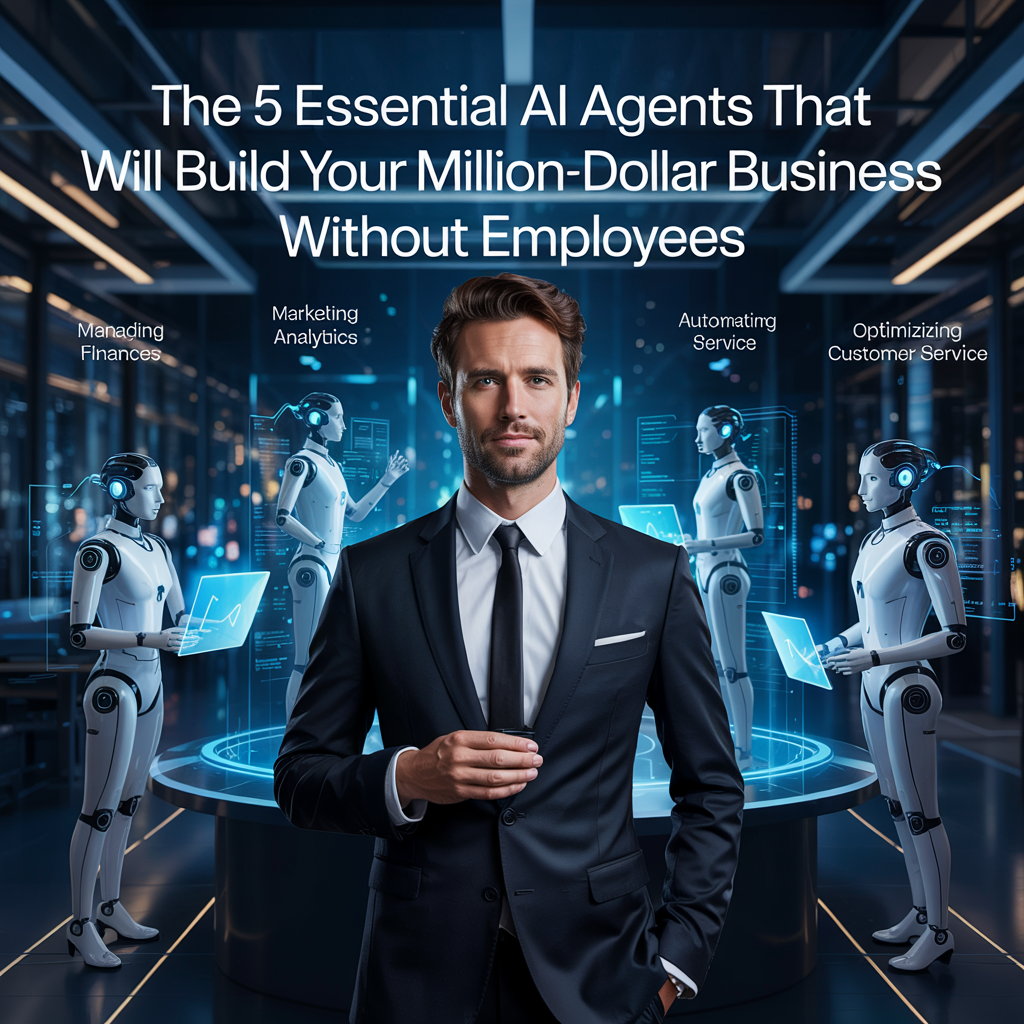The 5 Essential AI Agents That Will Build Your Million-Dollar Business Without Employees
Introduction: Understanding AI Agents
The 5 essential AI agents will revolutionize how entrepreneurs build million-dollar businesses without hiring additional staff members in today’s competitive landscape.
These aren’t typical tools like ChatGPT, Synthesia, or Midjourney that most business owners already know about and use regularly in their daily operations.
Instead, these powerful AI agents represent the cutting edge of what’s possible when artificial intelligence is properly harnessed to create sustainable growth and profitability.
I’ve personally witnessed these agents transform dozens of companies into streamlined, efficient operations that outperform their competition while maintaining lean organizational structures.
To properly understand the significance of AI agents, we must first distinguish between the three levels of AI knowledge that exist in the current business landscape.
Level one represents basic AI chat functionality that most businesses have already incorporated to some degree in their customer service or internal communications.
Level two encompasses AI workflows focused on process automation, using platforms like Make, Zapier, Gum Loop, and N8N to create systems that complete multiple steps without human intervention.
Level three—where AI agents operate—focuses entirely on outcomes, providing context-aware decision-making capabilities that can represent you in your inbox, calendar, and other business functions without requiring your direct involvement.
We strongly recommend that you check out our guide on how to take advantage of AI in today’s passive income economy.
Table of Contents
The Five Essential AI Agents For Business Growth
The Closer Agent: Revolutionizing Your Sales Process
The closer agent represents perhaps the most immediately impactful implementation of AI in a business context because it directly affects revenue generation within your organization.
One remarkable case study involves a company that stands on the verge of replacing their entire sales team with AI systems that handle everything from generating and qualifying leads to scheduling calls with prospects.
This radical transformation makes perfect sense from a business perspective because profit ultimately solves all problems in an entrepreneurial venture.
If implementing AI can increase income streams efficiently, that additional revenue can be strategically reinvested into other growth areas within the business ecosystem.
The closer agent focuses on three primary functions that previously required significant human resources to accomplish effectively in a traditional sales department.
First, lead intelligence encompasses all research, scraping, qualifying, and data enrichment tasks that traditionally consumed countless hours of a salesperson’s valuable time.
Second, closing support involves researching prospects, pulling previous conversation data, transcribing and summarizing interactions, and providing contextual information that enhances the effectiveness of human salespeople during their calls.
Third, the qualifying bot represents perhaps the most exciting advancement, using voice AI to handle initial inquiries, determine customer needs, qualify prospects based on budget and timeline, and even schedule appointments directly into calendars.
The Assistant Agent: Expanding Your Capacity
Once your sales process runs smoothly with AI assistance, the next critical step involves increasing your operational capacity through implementation of an assistant agent in your business workflow.
For years, the standard advice for entrepreneurs has emphasized hiring an executive assistant to handle administrative tasks, preventing business owners from wasting valuable time on $10-per-hour responsibilities.
Today, however, the optimal approach pairs a human executive assistant with AI capabilities, creating a synergistic relationship that maximizes productivity beyond what either could accomplish independently.
Refusing to implement AI alongside your assistant in the current business landscape makes about as much sense as returning to handling all administrative tasks yourself—it represents a significant competitive disadvantage.
The harsh reality remains that if you don’t have an assistant handling these tasks, you become one by default—an overpaid one who likely performs these administrative functions less efficiently than a dedicated specialist would.
Email sorting represents the first major task category where AI assistants excel, processing incoming messages, opportunities, and project updates by summarizing content, generating appropriate responses, and organizing information according to predefined parameters.
Calendar management forms the second critical function, handling scheduling, rescheduling, and all the back-and-forth communications that consume enormous amounts of time but generate minimal direct business value.
Bookings constitute the third major responsibility area, researching travel options, flights, hotels, and dining reservations without requiring human involvement in processes that essentially follow predetermined decision trees.
The Workflow Agent: Delivering Products And Services Efficiently
With sales and administrative functions operating smoothly, your next potential bottleneck involves the actual delivery of products or services to your customers in a consistent, scalable manner.
A common scenario that plagues growing businesses occurs when key team members depart, leaving behind outdated standard operating procedures and playbooks that haven’t been revised in months.
This situation typically arises because the business owner failed to implement systems that automatically update operational documentation and didn’t establish regular review protocols.
However, in today’s AI-enhanced business environment, entrepreneurs shouldn’t need to personally manage these tasks at all if they implement the right workflow agents into their operations.
Business author Michael Gerber famously wrote in “The E-Myth” that entrepreneurs should “let the systems run the business and the people run the systems”—but what if those systems could largely run themselves through AI implementation?
The system creator bot represents your first workflow agent priority, capturing video demonstrations of work processes, generating written standard operating procedures, and creating checklists that ensure consistent execution across your organization.
The office manager bot handles day-to-day operational functions like purchasing, scheduling, policy enforcement, and expense management, maintaining updated information that all team members can access through natural language interactions.
Customer support bots transform a traditionally labor-intensive department by automatically generating responses to inquiries based on existing knowledge bases, freeing human support staff to focus on relationship-building, upselling opportunities, and creating “wow” moments for customers.
The Amplifier Agent: Gaining Visibility For Your Business
With operational systems functioning efficiently, your next priority becomes attracting attention to your business through strategic content creation and distribution across relevant platforms.
A fascinating example of AI-powered content creation comes from a popular podcast that appears to feature a well-known celebrity sharing life philosophies and insights across hundreds of episodes.
What listeners don’t realize is that the celebrity has never actually recorded a single episode—the entire production uses AI-generated voice technology to create compelling content that millions of people consume daily.
This approach eliminates common content creation challenges like writer’s block, information limitations, and inconsistent publishing schedules while optimizing content based on audience engagement metrics.
Content analysis represents the first key function of your amplifier agent, examining performance data from existing content to identify patterns in high-performing versus underperforming materials.
The content checker ensures consistency in brand voice and tone by analyzing your existing content library and comparing new materials against established patterns to maintain cohesive messaging across all platforms.
Content creation handles the transformation of primary content into multiple formats—turning video transcripts into social media posts, newsletter content, and concise insights for various platforms, all optimized based on audience engagement metrics.
The Money Agent: Managing Financial Growth
Building a million-dollar business ultimately requires clear financial visibility and strategic cash management, making the money agent perhaps the most crucial implementation for sustainable growth.
Many entrepreneurs learn this lesson the hard way, focusing on sales and marketing while neglecting the fundamental principles of cash flow management until they face a crisis like missing payroll obligations.
This painful experience teaches that business growth requires capital, and rapidly expanding companies often experience temporary cash shortages despite strong sales performance.
Modern financial management isn’t about manually tracking every transaction but using AI to identify patterns that transform small revenue streams into significant profits through strategic decision-making.
The cash flow bot monitors financial activities in real-time, forecasting trends based on historical data, tracking collections and outstanding receivables, and providing actionable insights that prevent cash crunches during growth phases.
The payment bot automates accounts payable processes by scanning incoming documents, verifying purchase orders, routing approvals, and initiating payment workflows without requiring manual processing by finance staff.
The fraud bot provides peace of mind by continuously monitoring financial transactions for anomalies, identifying potential unauthorized activities, flagging unusual employee spending patterns, and alerting management to suspicious transactions before they cause significant damage.
The Human Element In An AI-Enhanced Business
Despite the remarkable capabilities of these AI agents, legitimate concerns exist about what these technologies mean for jobs, businesses, families, and communities in our rapidly evolving economy.
Historical perspective offers some reassurance, reminding us that before industrial automation changed family dynamics, communities functioned differently—with family members maintaining distinct roles and neighbors supporting each other during difficult times.
An optimistic view suggests that as AI handles mundane, repetitive tasks, humans will reclaim time for activities that bring genuine fulfillment and strengthen social bonds within our communities.
This transformation could allow entrepreneurs to build businesses aligned with their passions rather than market necessities, working with clients and team members they genuinely enjoy while offloading administrative burdens to artificial intelligence.
Perhaps business itself will evolve to resemble artistic expression more closely, with entrepreneurs applying creativity and personal vision to solve problems and create value without being constrained by operational limitations.
AI ultimately serves as a liberating force that frees human potential from mundane obligations, allowing people to focus on activities that bring joy, fulfillment, and meaningful connection with others.
The future of business likely belongs to entrepreneurs who embrace these AI agents not as replacements for human creativity but as tools that enhance and amplify uniquely human capabilities.
Success in this new landscape will come to those who maintain a clear vision of how technology serves human purposes rather than allowing technological capabilities to define business objectives and methods.
Conclusion: Taking Action On AI Implementation
Implementing these five essential AI agents in your business represents a significant competitive advantage in today’s rapidly evolving marketplace where efficiency and scalability determine winners and losers.
The closer agent, assistant agent, workflow agent, amplifier agent, and money agent work together to create a comprehensive system that handles routine business functions while freeing human creativity for higher-value activities.
Entrepreneurs who embrace these technologies position themselves to build million-dollar businesses with minimal employee overhead, maximizing profit margins while delivering exceptional customer experiences.
The transition requires initial investment in properly configuring these systems, but the return on investment quickly becomes apparent as operational efficiency increases and growth accelerates.
AI agents don’t eliminate the need for human judgment and creativity but rather create space for these uniquely human qualities to flourish without being consumed by administrative tasks.
The most successful implementations view AI as a partnership rather than a replacement, with humans and artificial intelligence each contributing their respective strengths to achieve business objectives.
The million-dollar businesses of tomorrow will be built by entrepreneurs who understand this fundamental principle and strategically implement AI agents to handle routine functions while focusing their own efforts on vision, strategy, and relationship-building.
The five essential AI agents described here provide a blueprint for that implementation, offering a clear path to building a profitable, scalable business without the traditional overhead of a large employee base.

We strongly recommend that you check out our guide on how to take advantage of AI in today’s passive income economy.




